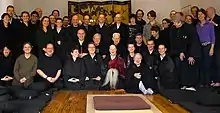Enkyō Pat O'Hara | |
|---|---|
 | |
| Title | Roshi |
| Personal | |
| Religion | Zen Buddhism |
| School | Sōtō and Rinzai Zen Peacemaker Circle |
| Lineage | White Plum Asanga |
| Senior posting | |
| Based in | Tisch School of the Arts Village Zendo |
| Predecessor | Tetsugen Bernard Glassman |
| Successor | Barbara Joshin O’Hara[1] Jules Shuzen Harris[2] Randall Ryotan Eiger Sinclair Shinryu Thomson Catherine Anraku Hondorp Julie Myoko Terestman Robert Kaku Gunn Jeremy Manasia Allan JoAn Tibbetts |
| Website | www.villagezendo.org |
Enkyō Pat O'Hara is a Soto Zen priest and teacher in the Harada-Yasutani lineage of Zen Buddhism.[3]
Biography
Growing up as a young white girl in Tijuana, Mexico while attending Catholic School in the United States, O’Hara was far too familiar with racism and prejudice. With one foot in each world, racial slurs and comments that were made to her left her feeling ostracized and insecure. However, it wasn’t until her high school years when she discovered and entered the Beat Generation and took to reading various literature including poems by Gary Snyder, who gave way to new ways of thought. It also in her high school years when she read R.H. Blyth’s translations of Haiku, Buddhist sutras, and writings of D.T. Suzuki that the door to Zen Buddhism opened, her attraction being Zen’s artistic expression.
O'Hara studied with John Daido Loori but differences with her teacher led her to begin studying with Taizan Maezumi, who himself was Loori's teacher.[4] However, it was when she began studying under Taizan Maezumi Roshi when she felt like she found her true teacher and main influencer. It was their shared love of freedom, new experiences, dharma, and love of empowering women that made O’Hara feel a strong connection, often referring to his teaching as feminine. It was with him that she began to study the Soto and Rinzai traditions.
O'Hara was ordained a Soto priest by Hakuyu Taizan Maezumi in 1995 and received shiho from Bernard Glassman in 1997.[4][5] In June 2004 Glassman gave O'Hara inka.[5]
She is abbot and founder of the Village Zendo in New York City.[4][6][7] She serves as co-spiritual director of the Zen Peacemaker Order along with Tetsugen Bernard Glassman.[8] She is also a former professor of interactive media at New York University's Tisch School of the Arts. She holds a doctorate in Media ecology. A socially engaged Buddhist, she is a member of the White Plum Asanga and manages the Buddhist AIDS Network.[3]
Activism
Much of Enkyo's activism is in the world of HIV/AIDS, from teaching meditation to HIV-positive practitioners to working on prevention strategies among those at risk, and serving as Chairperson of the Board of the National AIDS Interfaith Network. Enkyo, who is a lesbian,[7] has articulated a Zen Buddhist approach to issues dealing with sexuality, race, class, and health.
Bibliography
- O'Hara, Pat Enkyo (2014). Most Intimate: A Zen Approach to Life's Challenges. Shambhala Publications. ISBN 978-1590309742.
- O'Hara, Pat Enkyo (2020). A Little Bit of Zen. Sterling Ethos. ISBN 978-1454940593.
Gallery
 Village Zendo sangha
Village Zendo sangha




 with Joan Halifax
with Joan Halifax
See also
References
- ↑ "Barbara Joshin O'Hara". Village Zendo. Archived from the original on May 13, 2015. Retrieved April 26, 2015.
- ↑ "Jules Shuzen Harris, Sensei". Village Zendo. Retrieved April 26, 2015.
- 1 2 Skinner Keller, Rosemary; Rosemary Radford Ruether; Marie Cantlon (2006). The Encyclopedia of Women and Religion in North America. Indiana University Press. p. 1096. ISBN 0-253-34685-1. OCLC 61711172.
- 1 2 3 Boyle, Richard P. (April 24, 2015). "You Yourself Are Oatmeal". Tricycle: The Buddhist Review. Retrieved April 26, 2015.
- 1 2 "ZPO Founding Teachers-USA". Zen Peacemaker Order. Archived from the original on April 30, 2015. Retrieved April 26, 2015.
- ↑ Gregory, Peter N. (2007). Women Practicing Buddhism: American Experiences. Wisdom Publications. p. 41. ISBN 978-0-86171-539-8.
- 1 2 Wilson, Jeff (2000). The Buddhist Guide to New York. Macmillan. pp. 102–103. ISBN 0-312-26715-0. OCLC 44089480.
- ↑ "O'Hara, Pat Enkyo". Sweeping Zen. Archived from the original on October 30, 2015. Retrieved April 26, 2015.
External links
 Media related to Pat Enkyo O'Hara at Wikimedia Commons
Media related to Pat Enkyo O'Hara at Wikimedia Commons